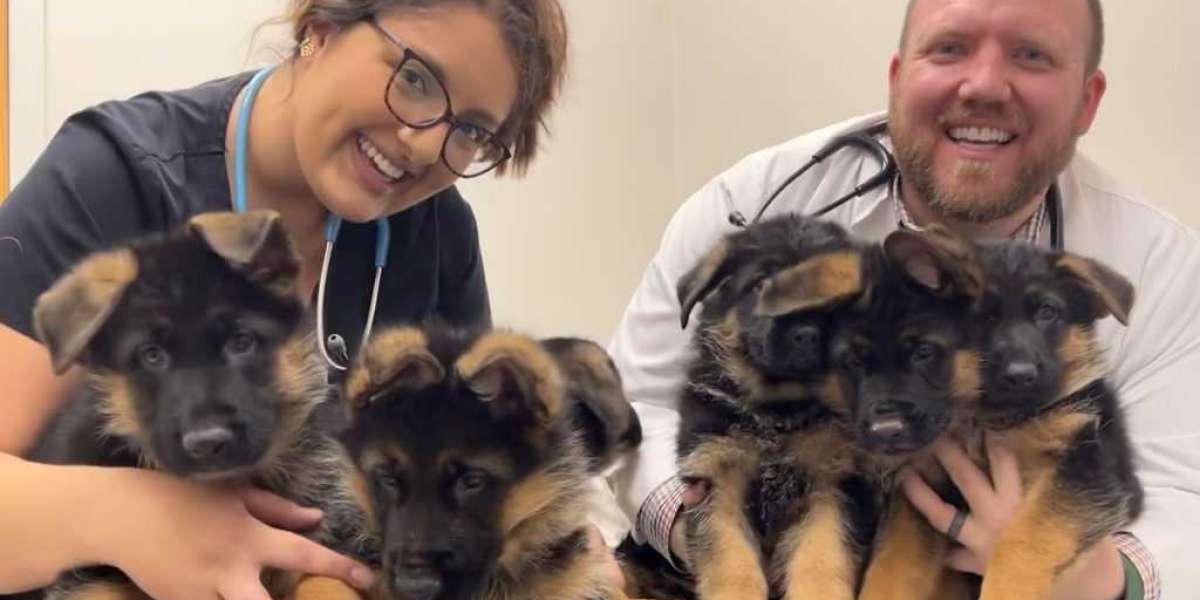 Exercise For Healthy German Shepherd Puppies
Exercise For Healthy German Shepherd PuppiesGerman Shepherd puppies, like all breeds of dogs, require regular physical and mental exercise. If they aren't sufficiently stimulated they could be bored and display destructive behavior, like digging or chewing on your favorite shoe!
Find a responsible breeder who is concerned about producing dogs with a balanced temperament. Find a responsible breeder who can conduct health tests and provide pedigree records for each puppy.
Health
German Shepherds also need to consume a balanced diet. They require a balanced diet of protein, carbohydrates, and fats, with some vegetables and fruits. Carbohydrates like those in whole grains, legumes and vegetables are a great source of energy that doesn't cause spikes and crashes. They also supply fiber as well as prebiotics (food for beneficial bacteria) and antioxidants. Proteins are crucial for the development, repair, and maintenance of tissues in the body. They provide amino acids, which are the building elements of all cells and aid in regulating blood sugar. Fats are crucial for regulating cholesterol and helping to prevent inflammation.
German Shepherds, just like all dogs are susceptible to muscle and joint problems. These conditions can be avoided by using a high-quality food for your dog, and avoiding table scraps and people foods and also exercising your GSD in a safe place when on a leash. Do not over-exert yourself with your dog; two hours of exercise a day is sufficient, particularly when you are a puppy.
 Certain German Shepherds are susceptible to a disease of the pancreas called exocrine pancreatic insufficiency. The Pancreas suffers from this condition, causing it not to produce the enzymes needed to digest and absorb dietary fats. Dogs with this condition starve to death, even though they are eating. Treatment involves the constant use of digestive enzymes in the diet.
Certain German Shepherds are susceptible to a disease of the pancreas called exocrine pancreatic insufficiency. The Pancreas suffers from this condition, causing it not to produce the enzymes needed to digest and absorb dietary fats. Dogs with this condition starve to death, even though they are eating. Treatment involves the constant use of digestive enzymes in the diet.German Shepherds are also prone to skin allergies, often developing allergic dermatitis at the age of one. This condition is similar to hay fever in humans, causing swelling, itchy paws and belly. Other areas, like the face or ears, can also develop dry, flaky, itchy skin. Our veterinarians can prescribe medication to ease your pet's discomfort and itching.
GSDs can also be affected by elbow dysplasia. This painful condition occurs when the elbow joints fail to form properly during puppyhood. In mild cases, we might suggest physiotherapy or weight reduction. If the condition gets more severe, we might recommend surgery to reduce stiffness and swelling. Parasites are a major concern for GSDs, which includes ticks, fleas, and ear mites, as well such as hookworms, ringworms roundworms, and heartworms. Our Central Texas veterinary specialists can prescribe the right medications to prevent and treat parasites.
Training
German Shepherds love to learn and excel at obedience training. Enroll your German Shepherd in a puppy or puppy obedience class to teach them basic commands like "sit," "down," and "stay." A reputable trainer can help you establish loose leash walking.
The training process is best conducted in person, however online videos can be a great resource. Hamilton Dog Training also has an excellent video of loose leash. The majority of adult family members is the one who assumes the role of the lead trainer, however should you choose a skilled trainer to work with your puppy it is usually simpler for all members of the family to train.
Proper training for potty is essential. A German Shepherd needs to understand SchäFerhund Kaufen that the potty is not inside. Potty pads may confuse them. If they're required to go, listen for them to whine or make a paw-print at the front door. Once they've learned this, they can walk along with you on a lead in the neighborhood, and go to pet stores or restaurants.
This is a very sensitive period for your German Shepherd, and socialization is crucial. This is the time that they will make connections that will influence their perception of the world throughout the course of their life. It's also a very critical moment for them to become familiar with different sounds, smells, and sights.
German Shepherds tend to be cautious and be attracted by movements (not in a negative manner). It's not uncommon to see them lunge or bark at cars that are approaching. This is their instinctual response.
Playing fetch with your German shepherd is a great opportunity to get him social. They will enjoy it and it's a way to release their natural drive to pursue things. This is an excellent way to give them something to do when you're not able to be there to play with them.
Exercise
German Shepherds are energetic and thrive when they exercise regularly. Exercise keeps them healthy and active. It also helps avoid boredom, frustration and behavioral issues such as excessive chewing and barking. It also provides a channel for their natural instincts and herding abilities. Exercise can help your pup concentrate on you and may even help reduce anxiety around separation.
Do not overdo the physical exercise for an German shepherd. Dogs who are young may develop joint and bone issues when they are exposed to too much impact or strenuous activities. You should be able to tell whether your dog is over-exercised by observing for signs of fatigue, such as slowing down and panting in comparison to the group. You can allow your dog to recover by taking them for shorter walks and slower play sessions.
Exercise can be provided by various activities, such as running or walking at a fast pace in fetching, or agility training. These exercises will also provide opportunities to socialize which is essential to your German Shepherd's mental well-being.
Going on a hike with your German Shepherd is a great method to get out of the house, into a fresh environment, and to get some exercise while strengthening his muscles. Swimming is also an excellent exercise for your German Shepherd, as it helps them gain strength without putting too much stress on their joints.
You could also try dog sports, such as flyball or agility to give your German Shepherd an intense workout that will tire them out mentally and physically. Dog sports are also a great method to help socialize your German Shepherd and can improve their obedience abilities. Territorial aggression is a common problem for German Shepherds however, exercising and training your dog regularly can aid in keeping it under control. If you notice your German Shepherd growling or barking at strangers, it could be an indication of territorial aggression and it is important to address immediately. If you observe that your German Shepherd is showing this behavior, talk to your veterinarian for advice and suggestions on how to help him relax.
Care
German Shepherds are smart and loyal. Their instincts of protection and loyalty make them a great companion. To keep them content it is essential to keep them mentally and physically active. This can be achieved through obedience training, Schutzhund competition, agility and other physical challenges. Regular walks and playtime are also important.
German Shepherds require a lot of exercise every day due to their size and strength. They also require a lot of athleticism. If you are unable to offer this to them, then arranging for an experienced dog-walker to take care of their needs is essential.
The care you give to your German Shepherd puppy starts with visiting the vet for their first health exam. A veterinarian will look at your puppy's spine and bone development and will recommend the appropriate diet and exercise recommendations for you and your new pet.
German Shepherds, as with all dogs, be affected by various health issues. These include hip and elbow dysplasias as well as degenerative myelopathys. degenerative spinal stenosis, and Von Willebrand's disease. These ailments are caused by environmental and genetic factors. Breeders who are responsible for screening for these conditions to stop them from being transmitted to their puppies.
In addition to these well-known health problems German Shepherds may also be susceptible to bloat. Gastric dilatation, also known as GDV is when the stomach gets filled with gas, it twists around itself, and then cuts off blood flow to an organ. It can be life-threatening. The symptoms include drooling and gasping, but no food is coming up an enlarged abdomen or a bloated stomach, hunching, restlessness and a slurred breath.
GDV can be prevented with a diet that does not contain a lot of fiber or a lot of carbohydrates. It can also be beneficial to include digestive enzymes in the dog's food. These enzymes are available in powder form and can be administered to your dog every day as directed by your veterinarian. It is also recommended to give your dog a monthly bath. This will keep his coat healthy and lessen the amount of shedding. It is also important to ensure that a bowl of clean, fresh water is available at all times for your German Shepherd. You can purchase a dog-safe dish from a pet store or online.







